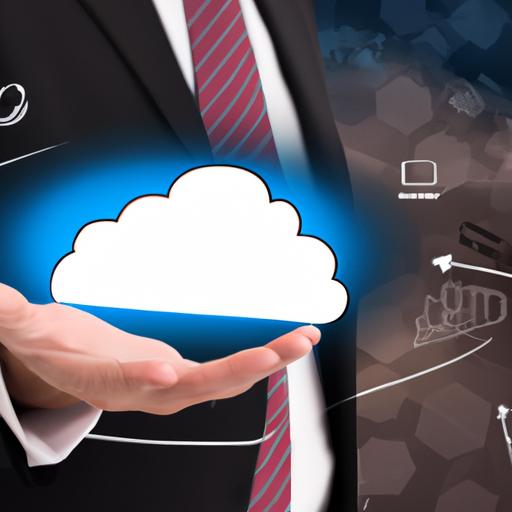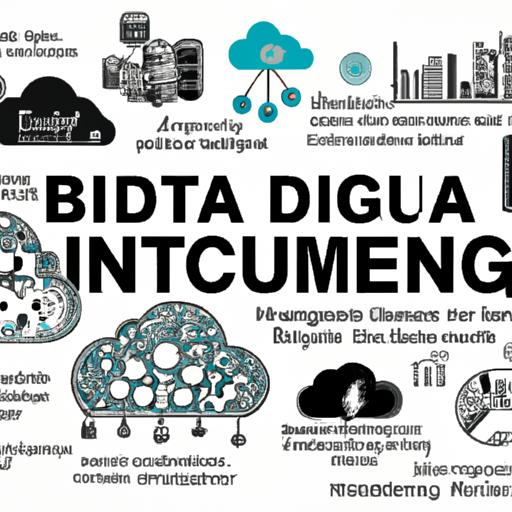As technology advances, businesses must keep up with the ever-changing landscape to remain competitive. Two significant technological advancements that have transformed the way we store, manage and analyze data are big data and cloud computing. These technologies have revolutionized the way businesses operate, providing a more streamlined and efficient way to handle large amounts of information.
Big data refers to the vast amounts of structured and unstructured data that businesses collect on a daily basis. This data can come from a variety of sources, including social media, customer feedback, and website analytics. The challenge with big data is making sense of it all. This is where cloud computing comes in.
Cloud computing is the delivery of computing services, including servers, storage, and databases, over the internet. By using cloud computing, businesses can store and access their data from anywhere, at any time, without the need for physical hardware. This allows businesses to scale their operations more efficiently and cost-effectively.
The importance and relevance of big data and cloud computing cannot be overstated. With the vast amounts of data being generated every day, it’s essential for businesses to have the right tools and infrastructure in place to manage and analyze this data. In the next sections of this article, we will dive deeper into the relationship between big data and cloud computing, understanding big data and cloud computing, and the applications of big data and cloud computing in business.
The Synergy Between Big Data and Cloud Computing

Unlocking insights with big data and cloud computing
How Big Data and Cloud Computing are Related
Big data and cloud computing are two technological advancements that complement each other perfectly. The amount of data generated by businesses today is staggering, and traditional on-premise data centers cannot handle the sheer size and complexity of this data. Cloud computing provides a scalable, cost-effective solution to store, manage and process big data while also enabling businesses to access their data from anywhere.
Cloud computing also provides businesses with the ability to store their data securely. By using cloud-based storage solutions, businesses can ensure their data is protected from theft, damage, or loss due to natural disasters. This is especially important given the sensitive nature of the data that businesses collect.
Benefits of Combining Big Data and Cloud Computing
The benefits of combining big data and cloud computing are numerous. Firstly, cloud computing provides businesses with the ability to store and process large amounts of data quickly and efficiently, without the need for expensive on-premise hardware. This allows businesses to scale their operations more easily and cost-effectively.
Secondly, cloud computing enables businesses to analyze their data in real-time, providing valuable insights into their operations. By using cloud-based analytics tools, businesses can identify patterns and trends in their data, which can help them make informed decisions about their operations.
Examples of Industries that Rely on Big Data and Cloud Computing
Many industries rely on big data and cloud computing to manage their operations and gain a competitive edge. For example, the healthcare industry uses big data and cloud computing to manage patient records and analyze medical data. The finance industry uses big data and cloud computing to detect fraud and make informed investment decisions. The retail industry uses big data and cloud computing to analyze customer behavior and personalize their marketing campaigns.
In the next section of this article, we will dive deeper into big data and cloud computing, understanding big data and cloud computing, and how these technologies are used in business.
Understanding Cloud Computing

Revolutionizing business with big data and cloud computing
Cloud computing has become an essential part of modern business operations. It allows businesses to store and access their data and applications over the internet, providing flexibility and scalability that traditional on-premise hardware cannot match.
Definition of Cloud Computing
Cloud computing refers to the delivery of on-demand computing services over the internet. These services can include servers, storage, databases, networking, software, and more. Businesses can access these services from anywhere, at any time, without the need for physical hardware.
Types of Cloud Computing
There are three primary types of cloud computing:
-
Infrastructure as a Service (IaaS): This is the most basic form of cloud computing, where businesses rent virtualized hardware, such as servers and storage, from a cloud provider.
-
Platform as a Service (PaaS): With PaaS, businesses rent a platform for developing and deploying their own applications, without the need to manage the underlying infrastructure.
-
Software as a Service (SaaS): This is the most complete form of cloud computing, where businesses rent fully functional software applications, such as email or customer relationship management systems, from a cloud provider.
Benefits of Cloud Computing
Cloud computing offers several benefits for businesses, including:
- Scalability: Businesses can scale their operations up or down quickly and easily, depending on their needs.
- Cost-effectiveness: Cloud computing eliminates the need for expensive physical hardware, reducing costs and increasing efficiency.
- Flexibility: Cloud computing allows businesses to access their data and applications from anywhere, at any time, on any device.
- Security: Cloud providers typically have more robust security measures in place than most businesses can afford to implement on their own.
Challenges of Cloud Computing
While cloud computing offers many benefits, it also presents several challenges, including:
- Limited control: With cloud computing, businesses must rely on their cloud provider for security and maintenance, which can limit their control over their own data and applications.
- Connectivity: Cloud computing requires a stable and reliable internet connection, which can be a challenge in some areas.
- Vendor lock-in: Once a business has committed to a cloud provider, it can be difficult and costly to switch to a different provider.
Applications of Big Data and Cloud Computing

The evolving landscape of big data and cloud computing
Big data and cloud computing have brought a significant change in the way businesses operate. They have revolutionized the data processing and storage landscape, allowing businesses to make data-driven decisions and gain a competitive edge. Here are some of the ways big data and cloud computing are used in business:
How Big Data and Cloud Computing are Used in Business
-
Business Intelligence: Big data and cloud computing enable businesses to gather, store and analyze data, helping them to gain insights into customer behavior and preferences, sales trends, and market gaps. This information is vital for businesses to make informed decisions and develop effective strategies.
-
Predictive Analytics: By using big data and cloud computing, businesses can predict future trends, identify potential risks, and make informed decisions based on data-driven insights.
-
Data Warehousing: Big data and cloud computing allow businesses to store large amounts of data in a centralized location, making it easier to access and analyze.
-
Customer Relationship Management: Big data and cloud computing enable businesses to gain insights into customer behavior and preferences, allowing them to tailor their products and services to meet their customer’s needs.
Use Cases and Success Stories of Big Data and Cloud Computing
-
Amazon: Amazon uses big data and cloud computing to personalize the customer experience. By analyzing customer data, Amazon can provide customized product recommendations, making the customer shopping experience more personalized and efficient.
-
Netflix: Netflix uses big data to understand its customer’s viewing habits and preferences. This information is used to create personalized recommendations, helping to improve customer satisfaction and retention.
-
Uber: Uber uses big data and cloud computing to optimize its ride-sharing service. By analyzing data on traffic patterns and demand, Uber can provide more efficient and cost-effective rides to its customers.
Future Trends and Developments in Big Data and Cloud Computing
Big data and cloud computing are continually evolving, and there are many exciting developments on the horizon. Here are some of the future trends and developments in big data and cloud computing:
-
Edge Computing: Edge computing is a distributed computing paradigm where data is processed near the source of the data. This approach reduces latency, improves security, and reduces bandwidth consumption.
-
Artificial Intelligence: Artificial intelligence (AI) is becoming increasingly important in big data and cloud computing. AI algorithms can analyze data more efficiently than humans, providing valuable insights and predictions.
-
Quantum Computing: Quantum computing is a new computing paradigm that uses quantum-mechanical phenomena to perform calculations. This technology has the potential to revolutionize the way we process and analyze data, providing faster and more efficient computing power.
In conclusion, big data and cloud computing have transformed the way businesses operate. They provide businesses with the tools and infrastructure they need to manage and analyze vast amounts of data, enabling them to make data-driven decisions and gain a competitive edge. As technology continues to evolve, big data and cloud computing will play an increasingly critical role in the success of businesses worldwide.
Conclusion
In conclusion, big data and cloud computing have become integral to modern businesses. The ability to collect, store, and analyze vast amounts of data has become a crucial competitive advantage for companies. Cloud computing has made it possible to scale up operations, store data efficiently, and access it from anywhere. By combining big data and cloud computing, businesses can make informed decisions, reduce costs, and provide better services to their customers.
It’s essential to understand the relationship between big data and cloud computing, the types of data, and the challenges and solutions for managing big data effectively. By doing so, businesses can leverage these technologies to achieve their goals and stay ahead of the competition.
As technology continues to advance, we can expect to see further developments in big data and cloud computing. However, one thing is for sure: the importance of these technologies in modern business operations will only continue to grow. So, whether you’re a small business owner or a large corporation, it’s time to embrace big data and cloud computing and take your business to the next level.